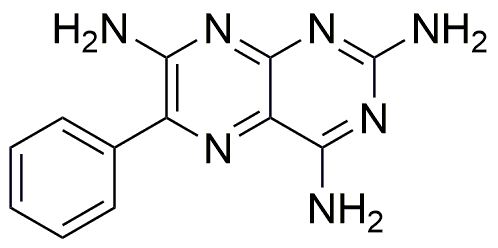Triamterene is widely utilized in research focused on
- Diuretic Medication: Commonly prescribed for managing hypertension and edema, it helps the body eliminate excess fluid without causing potassium loss, making it a preferred choice in certain patient populations.
- Pharmaceutical Research: Used in the development of new diuretics, researchers explore its mechanisms and potential combinations with other drugs to enhance efficacy and reduce side effects.
- Animal Studies: In veterinary medicine, it is investigated for its effects on fluid retention and blood pressure in animals, providing insights that can translate to human medicine.
- Analytical Chemistry: Employed in laboratory settings for the development of analytical methods to detect and quantify diuretics in biological samples, ensuring safety and compliance in pharmaceuticals.
- Cardiovascular Studies: Researchers examine its impact on cardiovascular health, particularly its role in managing conditions associated with fluid overload, contributing to better treatment protocols.
Informations générales
Propriétés
Sécurité et réglementation
Applications
Triamterene is widely utilized in research focused on
- Diuretic Medication: Commonly prescribed for managing hypertension and edema, it helps the body eliminate excess fluid without causing potassium loss, making it a preferred choice in certain patient populations.
- Pharmaceutical Research: Used in the development of new diuretics, researchers explore its mechanisms and potential combinations with other drugs to enhance efficacy and reduce side effects.
- Animal Studies: In veterinary medicine, it is investigated for its effects on fluid retention and blood pressure in animals, providing insights that can translate to human medicine.
- Analytical Chemistry: Employed in laboratory settings for the development of analytical methods to detect and quantify diuretics in biological samples, ensuring safety and compliance in pharmaceuticals.
- Cardiovascular Studies: Researchers examine its impact on cardiovascular health, particularly its role in managing conditions associated with fluid overload, contributing to better treatment protocols.
Documents
Fiches de données de sécurité (FDS)
La FDS fournit des informations de sécurité complètes sur la manipulation, le stockage et l’élimination du produit.
Spécifications du produit (PS)
Le PS fournit une description complète des propriétés du produit, notamment sa composition chimique, son état physique, sa pureté et les exigences de stockage. Il détaille également les plages de qualité acceptables et les applications prévues du produit.
Certificats d'analyse (COA)
Recherchez des certificats d'analyse (COA) en saisissant le numéro de lot du produit. Les numéros de lot et de lot se trouvent sur l'étiquette d'un produit, après les mots « Lot » ou « Lot de fabrication ».
Numéro de catalogue
Numéro de lot/série
Certificats d'origine (COO)
Ce certificat d'exploitation confirme le pays dans lequel le produit a été fabriqué, et détaille également les matériaux et composants utilisés et s'il est issu de sources naturelles, synthétiques ou autres sources spécifiques. Ce certificat peut être requis pour les douanes, le commerce et la conformité réglementaire.
Numéro de catalogue
Numéro de lot/série
Fiches de données de sécurité (FDS)
La FDS fournit des informations de sécurité complètes sur la manipulation, le stockage et l’élimination du produit.
DownloadSpécifications du produit (PS)
Le PS fournit une description complète des propriétés du produit, notamment sa composition chimique, son état physique, sa pureté et les exigences de stockage. Il détaille également les plages de qualité acceptables et les applications prévues du produit.
DownloadCertificats d'analyse (COA)
Recherchez des certificats d'analyse (COA) en saisissant le numéro de lot du produit. Les numéros de lot et de lot se trouvent sur l'étiquette d'un produit, après les mots « Lot » ou « Lot de fabrication ».
Numéro de catalogue
Numéro de lot/série
Certificats d'origine (COO)
Ce certificat d'exploitation confirme le pays dans lequel le produit a été fabriqué, et détaille également les matériaux et composants utilisés et s'il est issu de sources naturelles, synthétiques ou autres sources spécifiques. Ce certificat peut être requis pour les douanes, le commerce et la conformité réglementaire.


